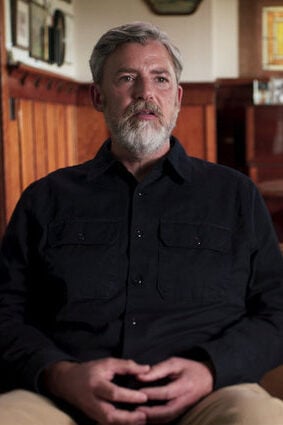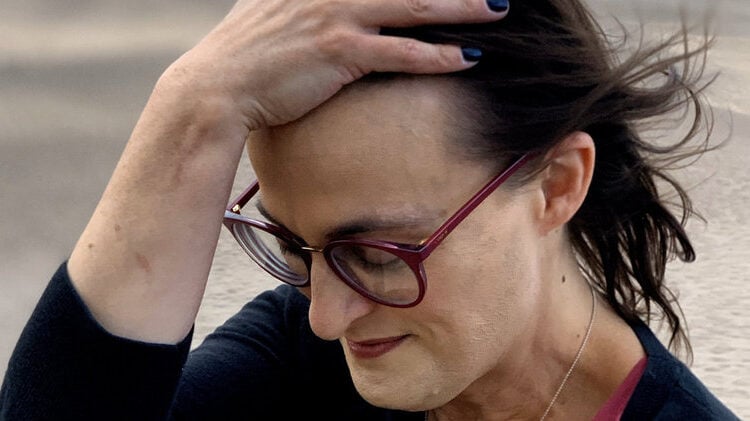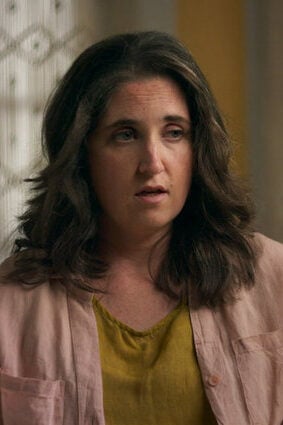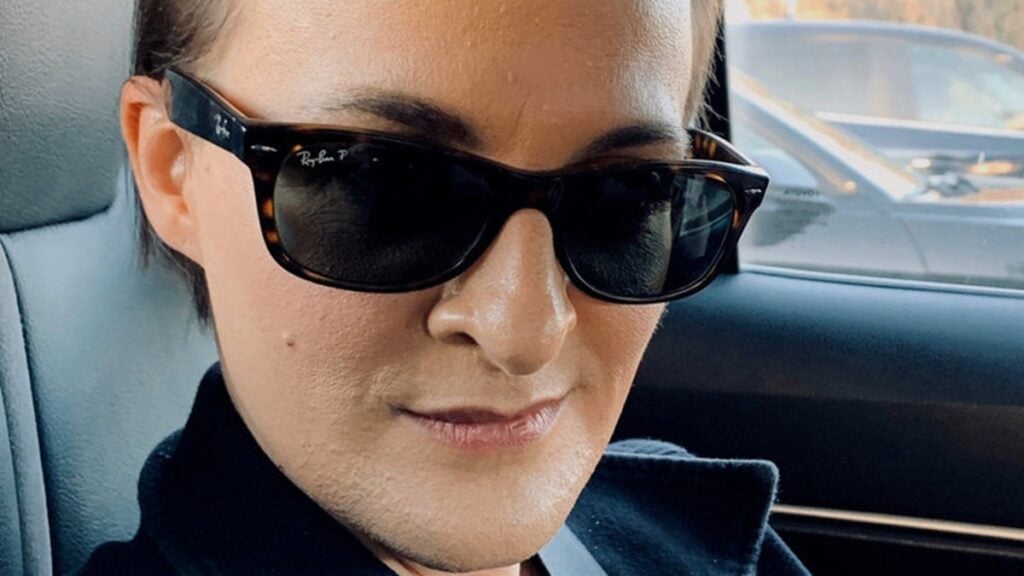Scammer, narcissist, gaslighter, and emotional terrorist are only a few words that come to mind when one thinks of Elisabeth Finch after tuning into Anatomy of Lies.
If you tuned into the three-episode documentary, it doesn’t begin to encompass the full breadth of what this diabolical woman unleashed on her family, friends, colleagues, and, frankly, the world of television.
Finch’s unconscionable mission to be famous has come true, as this woman will most certainly live the rest of her cancer-free days in infamy.
Anatomy of Lies Lets Elisabeth Finch’s Scandalous Story Speak for Itself
Regarding documentaries, Anatomy of Lies was solid in its execution and what they opted to present.
The orchestration was simple and got straight to the point, not opting for all the ridiculously absurd tactics others use to stand out.
Blessedly, they didn’t creep us out with AI-created voice audio in Finch’s likeness to narrate and chronicle her own words back to us.
They didn’t get carried away digging up the most irrelevant individuals with some distant connection to her to speak for or against her and her actions.

They tossed in a friend here and there she grew up with, but outside of that, they were devoid of heavy hitters. Who they chose was sufficient for the situation.
Fortunately, they didn’t spend too much time walking viewers through her childhood to build up this case of why she maybe, possibly, could be a sympathetic individual or search for some reason or excuse that explains why the fuck this woman is who she is (sorry for the vulgarity).
When Reality is Wilder Than Fiction
No, Anatomy of Lies smartly chooses to dive right into the primary story of Finch’s sins with colleagues, a friend or two, and, of course, her incredibly sympathetic wife and children.
They didn’t need any whistles and bells or a little sparkle to dazzle us with this docuseries because they knew that the sheer fuckery of Finch’s story was more than enough to keep viewers riveted, disgusted, glued to the screen.
And they were not wrong.

Also, in some sick and twisted way, it’s satisfying that for an appropriating leech and emotional succubus who seemingly fed off of attention and suffered from “Main Character Syndrome,” they didn’t roll out the carpet and sprinkle glitter on the shitfest that is Finch’s life and career.
Anatomy of Lies was difficult to watch, mostly because it was surreal that one woman could stoop as low as Finch to garner all the praise, accolades, affection, and adoration.
She was an insatiable void of need that could never be filled, and the extent of the damage she caused to everyone around her should be studied.
Truthfully, there’s little to say about Anatomy of Lies or Finch because of the sheer volume of her sins and how she got away with sowing an endless stream of lies is so remarkable that it leaves you speechless.
Anatomy of Lies Does NOT Try to Find Nuance or Extend Compassion to Finch
What do you even say about this woman?
It’d be harsh to say that hell isn’t hot enough, as there are still infinitely worse, more egregious, horrific, and violent things that warrant far more scrutiny.

But like a midseason finale of Grey’s Anatomy in its prime when it reigned supreme on network television, by the time the credits roll, you’re merely sitting there, dumbfounded with a racing heartbeat and spiked blood pressure, trying to process what you even saw.
Finch is ruthless — her pronounced narcissism almost makes it hard to believe that she got away with as much as she did for so long, but then, this is what happens when someone is a master manipulator and gaslighter.
What’s fascinating and notable about this particular docuseries is how strongly it holds its point of view.
There is no unbiased approach to this where the docuseries gives the illusion that it’s not taking a strong stance or tipping the perception of its subject to one side or the other.
Anatomy of Lies unmistakably takes Finch to task, with the precision of a scalpel, dissecting every last action, big or small, allowing it to build up to this impossible, unforgivable peak in which any ounce of sympathy, compassion, or understanding that could extend to this woman dies off.

Most of us are conditioned to search for some explanation, justification, or pathway to understanding why people do what they do and what makes them tick.
There’s Little Interest in What Drives Finch to Do What She Does
Anatomy of Lies does not care about that.
Instead, it weaves together the intricate web of lies that Finch masterfully expels for decades, revealing it to viewers and allowing them to feel as strongly about the audaciousness of this woman’s cruelty and malice.
We can speculate all we want about whether or not Finch had the propensity for this level of degeneracy throughout her life, but the turning point for this woman was after True Blood and The Vampire Diaries; it was when she longed to get involved with Grey’s Anatomy, a series she loved.
Instead of taking “No” for an answer when the series rejected her for a job position, her wheels were spinning as she searched for any other way to make this series a part of her life.
And she found one by fabricating a tale about having cancer.
But this is Elisabeth Finch, you guys. The woman treats one-upmanship like an Olympic sport, and she always comes home with the Gold Medal.

In the Oppression Olympics, Finch Always Wins
It’s one thing to fake cancer, but she had to ensure that her type was the worst of the lot, chondrosarcoma, and the worst case that her imaginary doctor had seen in a person of her age.
There wasn’t a terrible, traumatic experience this woman wouldn’t co-opt or appropriate.
She was latching onto unsuspecting individuals like a trauma vampire and feeding off of their trauma, experiences, and life for her own gain.
She carried herself like some sin-eater for other people’s pain, taking it all in herself, except she wasn’t carrying their loads to spare them or out of some misguided attempt to protect them but garner all the sympathy and recognition for a strength and resilience she simply does not possess.
Sympathy is how she weaseled her way into a Grey’s Anatomy writer’s room, and she spent the next few years holding people emotionally hostage and gaslighting to a remarkable degree.

Finch spun so many lies it was hard to keep up with them all in the span of these three installments, and the wildest thing about this tale is that it is somehow better than any fiction she or anyone could muster.
Remarkably, even when she was actively hurting other people, they still couldn’t bring themselves to see her for who and what she was for some time.
Finch Leaves Her Prints All Over Grey’s Anatomy’s Stories
Finch’s impact on Grey’s Anatomy is something the series can never wash clean, as her fingerprints are all over it.
As a Grey’s fan, I find it disturbing how much of the series then and even now still has her touch.

Most notably, if you’ve been following along with Grey’s Anatomy Season 21, Catherine is still battling the cancer that Finch pushed into the series in one of many efforts to integrate her fake life story into the series.
And as we await Catherine’s fate this season, even if the character, whose death sentence some time ago has been “changing the conversation on how people live with cancer,” dies, Finch’s twisted impact still lingers like a bad taste in the mouth.
From Co-opting Struggles to Self-Inserts, Finch Leaves a Blemish on Grey’s Anatomy
For one, her self-insert character still roams the halls of Grey Sloan as some walking, talking culmination of all the shit Finch made up or stole from other people.
As someone who notably refers to Wilson as “Woe is Jo,” it’s almost comical what this confirmation that Finch imposed herself onto this character does.

It speaks volumes and frankly explains so much about a character who, even for a primetime soap like Grey’s Anatomy, had far too many dramatic storylines to keep up with in its run.
Knowing that Finch was behind many of these choices is bizarre and gratifying, confirming that some viewers weren’t out of their minds about this character.
But it was also reprehensible how a personal and vulnerable conversation a colleague had with Finch became the background and plot for one of the most recognizable episodes of the series to date.
We ourselves lauded “Silent All These Years” for its exceptional writing and acting, powerful message about womanhood and trauma, and ode to trauma survivors everywhere.
It is shocking and appalling to know that Finch was behind that and essentially based the idea on a personal story she conjured up for herself that she ripped from a subordinate on the series.

The episode went on to win a Sentinel award, and the series got all of these accolades and this praise, and it’s all based on this woman’s egoism and ability to bulldoze over everyone around her.
Grey’s Anatomy still has Finch’s fingerprints all over the series, as she found ways to take over, weaponizing a fake cancer prognosis to manipulate others into sympathizing with her and never questioning her.
Finch’s Talent for Some Episodes Is Overshadowed by Her Infamy
Ironically, she’s behind some of the most irksome stories and installments (Alex’s fateful departure from the series that drove him to a farm-inspired by Jenn’s experience) and some of the most brilliant (Silent All These Years).
The sad part is that Finch is genuinely a great writer, and the fiction could and should’ve stood for itself without her ripping off other people or co-opting struggles for plots, making herself the most tragic and knowledgeable character in every room.
But even with all the hell she reaped upon her colleagues, it still didn’t compare to the damage she did to Jenn Beyer.

If anyone emerges from this docuseries as an inspiration, it’s Beyer, this long-time trauma survivor who managed to overcome a marriage with not one but two master manipulators and abusive individuals.
With every triggering detail Beyer shares (and she’s visibly, heartbreakingly triggered at many points in the doc), your heart aches for this woman and how she and her family got sucked into this toxic situation with the likes of Finch.
- The Beast In Me: Everything We Know So Far About the Netflix Limited Series Starring Claire DanesOctober 14, 2024
- The Paper: Everything We Know So Far of The Office SpinoffOctober 11, 2024
- The Institute: Everything We Know About Stephen King’s Upcoming MGM+ ThrillerOctober 9, 2024
It didn’t seem as if it could get much worse than Finch co-opting traumas and faking everything from cancer to sexual assault.
Finch Unleashes Emotional Destruction Upon Beyer and Her Children
As grotesque as those actions were (not to mention, and frankly, I have yet to fully process the specific low of accusing her own brother of assault and tarnishing his name), it’s the psychological damage that Finch unleashes on Beyer and her children that shifts Finch’s selfish mechanizations from self-serving to genuinely sadistic.

When it comes to Beyer, Finch is unquestionably a predator who preyed on a troubled woman genuinely battling mental health issues primarily related to an abusive relationship and exploiting it and her for all that it was worth.
Finch latched onto Beyer, falling into the routine of usurping Beyer’s issues, taking them on as her own, and proceeded to suck her dry of every ounce of energy, love, and light that this woman had to offer.
Finch’s Main Character Syndrome is Stranger Than Fiction
It’s true that Finch seemingly treated every new adventure in her life as some form of act in the multi-season series that was her life.
Her marriage and playing happy family with Beyer in her children were great for her until they weren’t, and she got bored with them.

She treated these severely traumatized and emotionally scarred real-life human beings like life-sized dolls in the background of her life story, and it was the most sickening aspect of an already stomach-turning docuseries.
When she met Finch, Beyer’s fragility and vulnerability didn’t stand a chance against this parasitic attention-seeker whose willingness to do anything for others was merely a reflection of herself.
Knowing that Finch never had an interest in children and then subsequently immersed herself as this parental figure in the lives of Beyer’s children after the horrific death by suicide of their unhinged father was enough to leave you handwringing as you knew that nothing good could ever come from this for those people who have already endured too much as it is.
Psychological Warfare from a Trauma Vulture
Beyer’s daughter shared how things shifted over time as Finch preoccupied herself with her work and pulled away.
Living across the street when she wasn’t wholly monopolizing Beyer’s time lest someone else ever get an ounce of attention was grating.

But it was the psychological warfare that Finch unleashed on Beyer, turning their loved ones against this woman, using her mental health struggles against her, gaslighting her, and turning her children against her — that was when Finch somehow found a trapdoor in hell to sink to newer lows.
How this woman could flip a switch when someone was no longer of use to her, insist on driving a vulnerable person crazy, and go as far as jeopardizing Beyer’s custody of her children in the process was diabolical beyond words.
Interestingly, as Beyer pieced things together, from the fake cancer to the horrific way Finch lied about her connection and trauma from the Tree of Life synagogue mass shooting, Finch, a slave to her own ego, didn’t even seem to care that the truth was coming out.
Will Hollywood Forgive Finch? She Thinks So
She eventually admitted to many of her lies, especially the cancer one. However, as the Anatomy of Lies indicates, she still believes this is a blip on the radar that people will get over.

She’ll move on to her next project and continue in Hollywood as if she hadn’t become one of the biggest scammers in recent years.
Hollywood is shockingly forgiving in many ways; as we know, there are many individuals who should’ve been “canceled” a million times over.
But Finch fails to realize that even in an age where we can embrace a good villain or scammer or make celebrities out of the depraved, there are even boundaries to that.
Plus, society isn’t kind to a villainous woman.

Anatomy of Lies’ scathing breakdown of Finch’s sins and the implication of her sociopathic levels of disinterest in any ramifications of her actions suggest that there’s no pathway for this woman to ascend to whatever status she’s recently striving for.
We’ve been held hostage by her elaborate and extreme plots for attention.
Once the credits rolled, it was evident that the best thing to do was never utter this detestable woman’s name again.
Rate Anatomy of Lies!
Over to you, TV Fanatics.
Did you tune into Anatomy of Lies? What are your thoughts?
The post Anatomy of Lies Review: Gaslight, Gatekeep, Girl Boss — The Emotional Terrorist Behind Grey’s Anatomy appeared first on TV Fanatic.
Source: TV Fanatic



